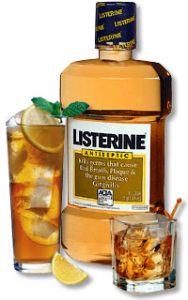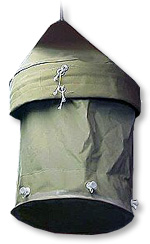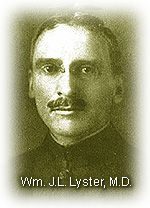 The name’s Lister. That’s “Mister Lister”
The name’s Lister. That’s “Mister Lister”
to you, Sister. Or it’s “Brother Dave Lister
the Hermit Monk” to you, Punk. But,
Listerine!? Why, you can just go
rinse and spit, Buster! Yeah, you
heard me right: Rinse and spit!
(As I will explain in a moment, the story’s headline alone was enough to dredge up dreaded memories of childhood traumas that I had long suppressed.) — Bro. Dave LISTER
*****
Drunk — on three glasses of Listerine®
Woman pleads guilty after car accident
ADRIAN, Mich. – A woman arrested after failing a sobriety test and telling police she drank three glasses of Listerine has pleaded guilty to drunken driving.
Carol Ries, 50, was pulled over after she rear-ended another vehicle at a red light on Jan. 9. She passed one breathalyzer test, but failed another that used different equipment.
Police found a bottle of Listerine in her car, and she told them she had drunk three glasses earlier in the day. Her blood alcohol level was more than three times the legal limit, police said.
According to Listerine manufacturer Pfizer Inc.’s Web site*, original formula Listerine contains 26.9 percent alcohol, while other varieties contain 21.6 percent alcohol.
Ries, who entered her plea last week, could face up to 93 days in jail and a $500 fine when she is sentenced. Prosecutors agreed to drop a charge of having an open intoxicant in the vehicle.
*Time passes, things change. So now, rather than on Pfizer’s Web site as cited in the news article, the product information referred to may be found on the official Listerine-specific Web site. On the Original Listerine® Antiseptic Mouthwash page, click the “Label & Directions” button and scroll down to the “Inactive Ingredients” section.)
*****
Hmm… Before I work myself into a righteously-indignant rant ’bout sometimes having been called “Listerine” back in grade school, I am compelled now to write a few lines first about “The Vanilla Lady” — a minor bit-player in the story of my life, a no-lines extra from among the cast of characters who appeared “Live on Stage” during an earlier stage in my existence.
After graduating from high school, I took a year off from pursuing my formal education, to work and save up some money before going off to college. I took a job on the night shift at a small grocery store on the edge of a small Midwestern town. I was 50% of a 2-person crew on most nights, from 10pm to 8am. But on the evening after receipt of the week’s main delivery of canned stock, I was a third of a 3-person crew. And my co-workers were women, both of whom were in their thirties, I suppose. They were both working mothers who sometimes mothered me, as if I was an eldest son or, perhaps, a kid brother. And during our shifts, we served customers and operated the cash registers and priced merchandise and stocked shelves and cleaned floors, et cetera, et cetera, and so forth.
One of the regulars who patronized the store in the wee hours of the morning was “The Vanilla Lady.” Well, that’s what we called her. I think she had a paper route, though I wouldn’t swear to that now. But some occupational responsibility would place her in our vicinity ’round 3 or 4 or 5 in the morning, when she would come in to buy a bottle or two of McCormick® Pure Vanilla Extract.
With me still being a relatively young and naive whippersnapper from a teetotaling evangelical Christian fundamentalist family, perhaps it was one of my maternal coworkers, Barb or Pat, who had to explain to me that The Vanilla Lady was probably not making an extraordinary amount of vanilla-flavored desserts. Nope. She, no doubt, was imbibing the extract for its alcohol content.
“Name your poison.” I don’t know, but I suppose most health care professionals who treat addictions would not make that much distinction between rum-based alcoholism and, say, a vanilla-based or even Listerine-based variety. Still, while I haven’t performed any side-by-side blind taste tests myself, it seems reasonable to expect pure vanilla extract to be more palatable than original formula Listerine (but either would seem far more palatable than, say, Sterno or aftershave or hair tonic or antifreeze, I’d guess). Another benefit of vanilla-based boozing is that pure vanilla extract must have a minimum alcohol content of 35% (surpassing original formula Listerine’s 26.9%, and equivalent to the 35% alcohol content of Captain Morgan’s Original Spiced Rum). And, too, denial is probably easier to come by when one is using a product that even most teetotaling evangelical Christian fundamentalist homemakers would guiltlessly stock in their cupboards, as opposed to less-readily-deniable abuse of traditionally-demonized libations such as Demon Rum, other evil spirits, wine (including ), or beer.
(Note: A couple of times after The Vanilla Lady had come and gone, we discovered a few empty pure vanilla extract boxes and bottles discarded and half-hidden among non-vanilla stock on random non-spice shelves. Because customer traffic was often next-to-nil between midnight and 5am, and because of the singular specificity of the item being pilfered, our list of possible suspects was limited to one person only. So the next few times The Vanilla Lady visited, we made a point of being obvious in arranging stock on shelves in the spice aisle all the while she was in the store. She stopped patronizing the establishment soon thereafter. No more vanilla thefts were detected. And that pretty-much wrapped my career as a heroic undercover crime fighter, I guess.)
*****
Now, regarding that righteously-indignant rant ’bout sometimes having been called “Listerine” back in grade school,… Well, forget it. While it is true that a few kids occasionally would try to get my goat through bastardizing my surname and calling me by the brand name of a yucky-tasting mouthwash, I guess I’ve outgrown that particular childhood pain. And, really, as schoolyard epithets go, “Listerine” is rather innocuous. So, hey, I’m over it. Sticks and stones.
Personally, I like Listerine. It’s one of the few brand name products I’ve been loyal to throughout my adult life. And though there are now other flavors of Listerine that each promise to be less-yucky, or even non-yucky, I have never tried any of them. I’m satisfied with the no-nonsense, butch, “I mean business” treatment of Listerine® Original-Formula Antiseptic Mouthwash, thank you very much.
 It doesn’t take much intelligence, imagination, or creativity to call a kid named Dave Lister a name like “Listerine.” More interesting is why Listerine is called “Listerine.” Although he didn’t invent the formula, the product long-known as Listerine is named after Joseph Lister (1827-1912), aka Baron Lister of Lyme Regis, the English surgeon who introduced the principles of antisepsis to standard surgical procedures and, thus, greatly reduced postoperative mortality — worldwide and happily ever after. Before Lister, a patient was as likely to die from post-op infection as from whatever it was surgery was meant to remedy in the first place.
It doesn’t take much intelligence, imagination, or creativity to call a kid named Dave Lister a name like “Listerine.” More interesting is why Listerine is called “Listerine.” Although he didn’t invent the formula, the product long-known as Listerine is named after Joseph Lister (1827-1912), aka Baron Lister of Lyme Regis, the English surgeon who introduced the principles of antisepsis to standard surgical procedures and, thus, greatly reduced postoperative mortality — worldwide and happily ever after. Before Lister, a patient was as likely to die from post-op infection as from whatever it was surgery was meant to remedy in the first place.
“What’s in a name?” A lister can be a certain kind of plow, planter, or seed drill. A lister can be a spear tipped with three or more prongs, used for gigging fish or frogs (Or schoolyard bullies who call you names like “Listerine”?). A lister can be someone or something (such as a specialized computer algorithm) that makes lists of any kind, or a lister can be the assessor who compiles the specific list(s) of data required for a system of taxation based, at least in part, on property values. And the derivation of the surname Lister (English/German) is thought to have indicated someone who originally came to England from Liste, Germany (and who, incidentally, was likely to be someone who dyed cloth). Then, there are a lot of Lister-based words and phrases which, like Listerine, were all coined in honor of Dr. Joseph Lister and include: Lister dressing, Lister method, Lister tubercle, Listera, Listera convallarioides, Listera cordata, Listera ovata, Listerella, Listerellosis, Listeria, Listeria denitrificans, Listeria grayi, Listeria infections, Listeria meningitis, Listeria monocytogenes, Listerial, Listerian, Listeriosis, Listerism, and Listerize. (Wow! Some list, huh?)
A ”Lister bag” (aka ”Lyster bag”) — a rubberized canvas container used to store, purify (by the addition of chlorine), cool, and dispense potable water for troops deployed in the field and on the battlefront.Hotcha!
 And from my own military experience, I can vouch for the existence of a “Lister bag.” (Keep your mind outta the gutter, okay?) The Lister bag looks very similar to a U.S. Army standard-issue, olive-drab green, canvas duffle bag. But it is used to store, disinfect, cool, and dispense drinking water for troops out in the field. The bag may be suspended from a tripod or tree branch or whatever. It can contain several gallons of water, which may be accessed from spigots mounted on the side, down near the bottom of the bag. (I’ve yet to learn where the Lister bag gets its name, but I imagine that Doctor/Baron Joseph Lister is not the namesake. This, however, is just a hunch.)
And from my own military experience, I can vouch for the existence of a “Lister bag.” (Keep your mind outta the gutter, okay?) The Lister bag looks very similar to a U.S. Army standard-issue, olive-drab green, canvas duffle bag. But it is used to store, disinfect, cool, and dispense drinking water for troops out in the field. The bag may be suspended from a tripod or tree branch or whatever. It can contain several gallons of water, which may be accessed from spigots mounted on the side, down near the bottom of the bag. (I’ve yet to learn where the Lister bag gets its name, but I imagine that Doctor/Baron Joseph Lister is not the namesake. This, however, is just a hunch.)
*****
And that, Pilgrim, is that.
If you have, or someone you know has, a Listerine problem or a vanilla problem or even a Demon Rum problem, please consult health care professionals and local support groups that specialize in addictions counseling, treatment, and recovery.
And now, m’Dear, I’m outta here.
Be well, be happy. Know peace, know love. Find joy wherever it awaits you. Live in light, live in bliss. Bless your heart. (And may you always have fresh breath — mediciney or minty or cinnamony or citrus-fruity or whatever-you-choose, but never-ever bated by the threat of a police-action pullover, righteous arrest, DUI conviction, punitive fine and/or hard-time incarceration.)
Love ‘n’ sticky stuff, Brother “Don’t freakin’ call me Listerine!” Dave Lister
*****
 PS: Soon after posting all of the above, curiosity compelled me to research the origin of the Lister bag’s name. As it turns out, the bag was invented by U.S. Army surgeon Major William J. L. Lyster (1869-1947). And, yes, that’s Lyster with a “y”. But, apparently, Lyster is pronounced the same as Lister, and this aural similarity probably accounts for the discrepancy between the names of the inventor and his otherwise-eponymous invention. Although some of the sources I discovered also include the term “Lyster bag,” it is usually referred to as being a variant of the more-preferred “Lister bag.” And a simple Google search comparison revealed “Lister bag” to be almost 250% more popular than “Lyster bag.” (I started to wonder whether some long-ago Army SNAFU might have been the original cause of this discrepancy when, in a document about another U.S. Army surgeon surnamed Lyster, I saw that, immediately after the first citation of the Lyster name in the title, the phrase “correction of Lister” was included in brackets and each Lyster citation thereafter was followed by the word “corrected” in brackets. Still, a quick perusal of the Army’s current edition of the manual on “Field Hygiene and Sanitation” [FM 21-10] reveals the term “Lyster bag” is used throughout. So, go figure.) Between multiple sources, Dr. Lyster is variously listed as having developed his water sterilization system in 1913 or 1915 or 1917. (Kinda odd that only odd-numbered years are cited, huh?) Troops in the field may fill the bag with raw water from a local source, add calcium hypochlorite to disinfect the water, wait 30 minutes for complete chlorination, then dispense potable (drinkable, although not necessarily palatable) water. Lyster’s simple invention has been key to curbing dysentery and other water-borne illnesses that would otherwise imperil field-deployed troops worldwide, thus “Putting THE RUNS on the run for nearly a century now.” — BD
PS: Soon after posting all of the above, curiosity compelled me to research the origin of the Lister bag’s name. As it turns out, the bag was invented by U.S. Army surgeon Major William J. L. Lyster (1869-1947). And, yes, that’s Lyster with a “y”. But, apparently, Lyster is pronounced the same as Lister, and this aural similarity probably accounts for the discrepancy between the names of the inventor and his otherwise-eponymous invention. Although some of the sources I discovered also include the term “Lyster bag,” it is usually referred to as being a variant of the more-preferred “Lister bag.” And a simple Google search comparison revealed “Lister bag” to be almost 250% more popular than “Lyster bag.” (I started to wonder whether some long-ago Army SNAFU might have been the original cause of this discrepancy when, in a document about another U.S. Army surgeon surnamed Lyster, I saw that, immediately after the first citation of the Lyster name in the title, the phrase “correction of Lister” was included in brackets and each Lyster citation thereafter was followed by the word “corrected” in brackets. Still, a quick perusal of the Army’s current edition of the manual on “Field Hygiene and Sanitation” [FM 21-10] reveals the term “Lyster bag” is used throughout. So, go figure.) Between multiple sources, Dr. Lyster is variously listed as having developed his water sterilization system in 1913 or 1915 or 1917. (Kinda odd that only odd-numbered years are cited, huh?) Troops in the field may fill the bag with raw water from a local source, add calcium hypochlorite to disinfect the water, wait 30 minutes for complete chlorination, then dispense potable (drinkable, although not necessarily palatable) water. Lyster’s simple invention has been key to curbing dysentery and other water-borne illnesses that would otherwise imperil field-deployed troops worldwide, thus “Putting THE RUNS on the run for nearly a century now.” — BD
 PPS: I’m a big fan of Buffy the Vampire Slayer and its spin-off series Angel. I have all 12 DVD box-sets of these shows (7 seasons of Buffy, 5 seasons of Angel) that I’ve been viewing in a regular obsessive-compulsive rotating schedule for the past two years now. Jeez. Usually, I’ll watch one series in sequence from beginning to end, then turn to the other series. (Recently, however, I’ve also included Firefly, the third TV series created by Joss Whedon, in the playback rotation. Whew!) And blah, blah, blah. Why am I telling you this? Well, earlier on this page, when I was citing various definitions of “lister,” the derivation of the Lister surname, and a lot of Lister-based words and phrases, I forgot to mention Lister Demons. Some members of this species of demon were featured in the “Hero” episode of Angel (Season 1, Episode 9). Lister Demons are benign, hybrid beings — part human, part a particular breed of demon — who simply seek a free and peaceful existence, away from the prejudice of humankind and safe from the genocidal bloodlust of a Nazi-like army of self-proclaimed pureblood demons, The Scourge, who would exterminate the Listers and all other demon species whom they deem to be impure and inferior. (Damned freakin’ Nazis!) From whence the Lister Demons got their name, I haven’t a clue. (But I imagine that neither Doctor/Baron Joseph Lister nor Doctor/Major William Lyster is their namesake. This, however, is just another hunch.) Still, because the Lister Demons and I share the same name, I’m pleased that they’re benign and not, as is more often the case with demons, EVIL. — BD
PPS: I’m a big fan of Buffy the Vampire Slayer and its spin-off series Angel. I have all 12 DVD box-sets of these shows (7 seasons of Buffy, 5 seasons of Angel) that I’ve been viewing in a regular obsessive-compulsive rotating schedule for the past two years now. Jeez. Usually, I’ll watch one series in sequence from beginning to end, then turn to the other series. (Recently, however, I’ve also included Firefly, the third TV series created by Joss Whedon, in the playback rotation. Whew!) And blah, blah, blah. Why am I telling you this? Well, earlier on this page, when I was citing various definitions of “lister,” the derivation of the Lister surname, and a lot of Lister-based words and phrases, I forgot to mention Lister Demons. Some members of this species of demon were featured in the “Hero” episode of Angel (Season 1, Episode 9). Lister Demons are benign, hybrid beings — part human, part a particular breed of demon — who simply seek a free and peaceful existence, away from the prejudice of humankind and safe from the genocidal bloodlust of a Nazi-like army of self-proclaimed pureblood demons, The Scourge, who would exterminate the Listers and all other demon species whom they deem to be impure and inferior. (Damned freakin’ Nazis!) From whence the Lister Demons got their name, I haven’t a clue. (But I imagine that neither Doctor/Baron Joseph Lister nor Doctor/Major William Lyster is their namesake. This, however, is just another hunch.) Still, because the Lister Demons and I share the same name, I’m pleased that they’re benign and not, as is more often the case with demons, EVIL. — BD
Listerine® Original-Formula Antiseptic Mouthwash:
• Helps prevent and reduce plaque build-up, gingivitis, and bad breath.
• Has the American Dental Association Seal of Acceptance for helping to control plaque and gingivitis.
• Helps prevent and reduce supragingival plaque accumulation and gingivitis when used in a conscientiously applied program of oral hygiene and regular professional care. Use when brushing and flossing aren’t enough.
• Became the first over-the-counter mouthwash in 1914.
• Available sizes: 3 fluid ounces, 250 ml (8.5 fl oz.), 500 ml (16.9 fl oz.), 1 liter (33.8 fl oz.), 1.5 liters (50.7 fl oz.), and 1.7 liters (58 fl oz.).PPPS: As for Ms. Carol Ries, the 50-year-old Listerine-besotted driver who rear-ended another vehicle at a red light in Adrian, Michigan, well, she was sentenced to two years of probation. A condition of her sentence requires her to take breathalyzer tests twice a day, every day, throughout the term of her probation. And she was ordered to pay $1,095 in fines and court costs. article I read, no mention was made as to whether the court had recommended a substitute, non-alcoholic mouthwash for Ms. Ries’ regular regimen of oral hygiene — to fight bad breath, plaque, gingivitis, and potential for future DUI-type crime and punishment.) And so it goes. — BD
PPPPS: For another entertaining essay that further considers the Lister (and Lyster) surname(s) within a historical (if not hysterical) context, check out A Lister Rode The Mayflower, published elsewhere on this site. — BD